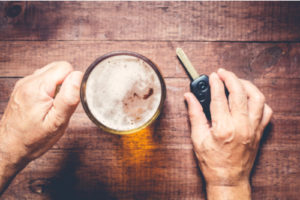Legally Reviewed By:
Brian P. Gabriel, Esquire

When you’re arrested for DUI in West Palm Beach, the arresting officer asks for you to take a chemical test to measure your BAC or blood alcohol content. Typically, the officer will request a breath sample, but blood and urine tests are other options. Most of the time, officers rely on the Intoxilyzer 8000 — the state’s only breathalyzer whose results may be used in court as evidence — because it’s considered more accurate than a urine test and less invasive than a blood test.
Florida’s implied consent law requires you to take a chemical test or you could face penalties separate from any that may follow a DUI conviction. Regardless, some drivers refuse to give police what they believe will be damaging evidence against them. However, there are some instances where drivers are charged with refusing to submit to a BAC test even though they did not flatly refuse to cooperate with police officers.
Understanding Implied Consent
Any individual who accepts the privilege of driving in Florida gives his or her consent to submit to lawful requests for BAC testing, whether it be a urine, blood, or breath test. So, when you apply for a Florida driver’s license, you automatically consent to these searches. By refusing to give a blood, breath, or urine sample, you violate the law regardless of whether you are ultimately convicted of DUI.
Police Must Inform You of Consequences for Refusing to Test
The police officer arresting you for DUI must inform you of the consequences you may face for refusing to submit a blood, breath, or urine sample. In Florida, penalties for refusing a BAC test the first time include a mandatory license suspension of up to one year. If you refuse a second time, you face a misdemeanor charge. Penalties may include:
- A driver’s license suspension of 18 months
- A first-degree misdemeanor charge on your record
- Up to one year in jail or 12-month probation
- A fine of up to $1,000
- Ineligibility for a diversion program
Your refusal to take the test may also be used against you in court, so it’s usually wise to comply with lawful requests and hire an attorney as soon as possible after your DUI arrest.
Your DUI defense lawyer has several tactics he may use to challenge the results of your BAC test, and may even challenge the officer’s actions if he finds evidence that the officer did not follow the proper testing procedures. If such evidence comes to light, it may be possible to have your test results thrown out so they cannot be used against you. It might even be possible to have your entire case dismissed depending on how much evidence of police wrongdoing your lawyer uncovers.
How Do Police Officers Interpret Refusal to Take a DUI Breath Test?
Not all cases of refusing to submit to a BAC test like a breath, blood, or urine test are black and white cases where it’s obvious the suspect said “no.” Police can interpret a refusal when the driver takes certain actions that aren’t necessarily intended to disrupt the investigation.
- In one scenario, it’s possible that the driver agreed to the breath test and then was incapable of providing 2 breath samples of sufficient quantity within the allotted time.
- In another scenario, a driver might have provided 2 breath samples that were not within 0.02 of each other. When this happens, the officer must ask for a third breath sample. A driver who refuses the third breath sample may be charged with refusing to submit.
- A driver who becomes argumentative with the arresting officer, but does not necessarily refuse a chemical test, might face a charge of refusing to submit to testing.
If you found yourself in a similar situation after a DUI arrest in West Palm Beach, you need an attorney with years of experience fighting DUI charges. Attorney Brian Gabriel has dedicated more than 30 years to doing just that in Palm Beach County.
Choose an Established DUI Lawyer for Quality Defense
Attorney Brian P. Gabriel’s legal practice is anchored by defenses in DUI cases. As a sole practitioner, he has helped many people overcome the challenges of a criminal charge by providing close, personal attention to each case. Call 561-622-5575 or complete a contact form for a free consultation.



